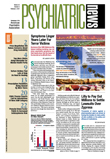The final recommendations of the federal Medicaid Commission could encourage state and federal administrators to expand cost-saving initiatives that could limit care for beneficiaries with mental illness, according to mental health advocates.
The Medicaid Commission, established in May 2005 by Mike Leavitt, secretary of Health and Human Services (HHS), submitted final recommendations to Leavitt for long-term changes to Medicaid in December 2006 that aimed to “ensure the long-term sustainability of the program.” Although the recommendations did not specifically address mental illness, many of them could have a substantial impact on beneficiaries with mental health problems, according to mental health advocates. Chief among their concerns is that the recommendations would give states more flexibility to reduce eligibility and services in their Medicaid programs.
“Instituting rewards for healthy behaviors sounds positive, but it also has been interpreted to mean withdrawing benefits from people who don't comply with a state's idea of healthy behaviors,” said Mary Giliberti, director of public policy and advocacy at the National Alliance on Mental Illness, in an interview with Psychiatric News. “We certainly don't favor that when it involves cuts to mental health benefits and prescription drug benefits.”
The concerns of mental health advocates stemmed from changes implemented under the 2005 Deficit Reduction Act (DRA), which gave state Medicaid programs greater latitude to amend their programs to increase cost-sharing and premiums or to reduce benefits. States that amended their programs under the DRA, such as West Virginia, Kentucky, and Florida, have drawn criticism from mental health advocates for changes that placed a heavier compliance burden on beneficiaries with mental illness than they are often able to meet (Psychiatric News, June 2, 2006).
Additional major changes to federal Medicaid requirements may require congressional action, but less substantive changes may be implemented by HHS officials or state administrators.
A major component of the DRA allows states to implement service, premium, and cost-sharing changes simply by amending their state Medicaid plans. Prior to the DRA, states seeking such sweeping alterations to their programs required a public review process and approval of a waiver by the HHS secretary.
Twelve states require that their legislatures approve the publicly reviewed waivers in order to change Medicaid programs, but only two require legislative endorsement of administratively approved state plan amendments, such as those enacted by West Virginia and Kentucky, according to data compiled by Mental Health America (MHA), formerly the National Mental Health Association.
Commission Backs Self Management
The commission called for beneficiaries to accept more responsibility for their health and health care. Specifically, the commission emphasized its support of federal Medicaid policies that promote “partnerships between states and beneficiaries that emphasize beneficiary rights and responsibilities and reward beneficiaries who make prudent purchasing, resource-utilization, and lifestyle decisions.”
The emphasis on beneficiary responsibilities—also a component of the DRA—raised concerns among mental health advocates, who question whether beneficiaries with mental illness can realistically “manage” their own health care. The impact of self-management policies on beneficiaries with mental illness—including 38 percent of the 7.5 million people who qualify for Medicaid and Medicare because of “serious mental impairments”—has not yet become clear, according to advocates.
West Virginia Medicaid officials used their authority under the DRA, for example, to implement a Medicaid amendment in 2006 that requires beneficiaries who need mental health care to adhere to a treatment regimen in order to retain their benefits.
Kirsten Beronio, senior director of government affairs at MHA, said placing the onus on beneficiaries with mental illness to manage their health care can be “unrealistic” in light of the seriousness of some of the illnesses from which they suffer. She suggested that careful federal oversight is a better way to protect the rights of such Medicaid recipients than is ceding more power to state Medicaid officials to reform programs.
Cost Sharing Appeals to States
The effort to control costs was the focus of many of the commission's recommendations and a driving force behind the DRA and other efforts to overhaul entitlement programs. Federal and state governments combined spent nearly $325 billion on Medicaid in Fiscal 2006, according to the commission, and Medicaid spending is expected to exceed $450 billion by 2011. In light of the projected costs, more states will probably consider major changes to their Medicaid rules to control the cost of a program that has become the largest single category of state spending, surpassing elementary and secondary education.
One approach to Medicaid cost control first authorized by the DRA is to increase the share of costs for which beneficiaries are responsible. Though the Medicaid Commission did not specifically address this approach to controlling costs, it did endorse the “innovative approaches” states have used under the DRA to control their Medicaid costs and urged federal officials to allow states even more “flexibility to innovate.”
Patient advocates point out that although the federal law may have given states more flexibility to institute controversial cost-sharing programs for Medicaid beneficiaries, the states' own laws may further inhibit that particular cost-reduction approach. Twenty-two states had some form of statutory requirements related to Medicaid cost sharing, according to a review by the National Health Law Program.
Other cost savings for states and the federal government, said the commission, could come from “innovative care-management strategies,” such as a proposed Medicaid Advantage program for dual eligibles. This proposed program would provide a “medical home”—that is, a primary point of care with a physician who provides primary care services and manages all other aspects of care—and better coordinated care for dual-eligible beneficiaries.
Beronio said concerns over increasing costs could be more effectively addressed through increased access to community-based care, which has been found less expensive than the institutional care that federal funding formulas tend to favor.
“That could lead to significant cost savings in terms of reducing the need for emergency room care for beneficiaries who don't fit the institutional care approach,” she said.
